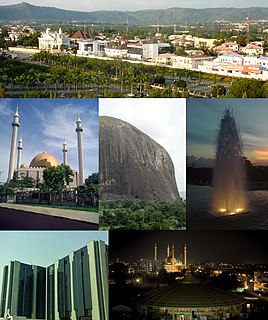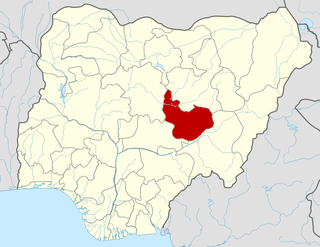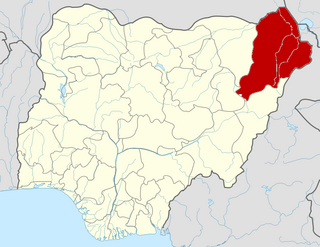| 2011 northern Nigeria bombings | |
|---|---|
| Location | Abuja, Bauchi, Zaria and Maiduguri, Nigeria |
| Date | 29 May 2011 |
Attack type | Bombings, terrorism |
| Weapons | IEDs |
| Deaths | 15 |
Non-fatal injuries | 55 |
| Perpetrators | Boko Haram |
The May 2011 northern Nigeria bombings happened in several towns in northern Nigeria on 29 May 2011. The blasts happened just a few hours after Goodluck Jonathan was sworn in as Nigeria's president. [1] Boko Haram was suspected in the attacks. [2]

Nigeria, officially the Federal Republic of Nigeria, is a federal republic in West Africa, bordering Niger in the north, Chad in the northeast, Cameroon in the east, and Benin in the west. Its coast in the south is located on the Gulf of Guinea in the Atlantic Ocean. The federation comprises 36 states and 1 Federal Capital Territory, where the capital, Abuja, is located. The constitution defines Nigeria as a democratic secular country.

Goodluck Ebele Azikiwe Jonathan is a Nigerian politician who served as the President of Nigeria from 2010 to 2015. Prior to that he served as Vice-President of Nigeria from 2007 to 2010 and as Governor of Bayelsa State from 2005 to 2007.

The Islamic State in West Africa or the Islamic State's West Africa Province, formerly known as Jamā'at Ahl as-Sunnah lid-Da'wah wa'l-Jihād and commonly known as Boko Haram until March 2015, is a jihadist terrorist organization based in northeastern Nigeria, also active in Chad, Niger and northern Cameroon.
The first explosion struck the Zuba International Market in Abuja, killing two people (including a young girl) and injuring 11 others. Three blasts also struck the Mammy Market in Bauchi, near the headquarters of Nigeria's 33rd Artillery Brigade. Thirteen died and 40 were injured. [1] No soldiers were injured. [3] Two bombs also went off in Zaria, seriously injuring four. [1]

Abuja is the capital city of Nigeria located in the centre of the country within the Federal Capital Territory (FCT). It is a planned city and was built mainly in the 1980s, replacing the country's most populous city of Lagos as the capital on 12 December 1991. Abuja's geography is defined by Aso Rock, a 400-metre (1,300 ft) monolith left by water erosion. The Presidential Complex, National Assembly, Supreme Court and much of the city extend to the south of the rock. Zuma Rock, a 792-metre (2,598 ft) monolith, lies just north of the city on the expressway to Kaduna.

Bauchi is a city in northeast Nigeria, the capital of Bauchi State, of the Bauchi Local Government Area within that State, and of the traditional Bauchi Emirate. It is located on the northern edge of the Jos Plateau, at an elevation of 616 m. The Local Government Area covers an area of 3,687 km2 and had a population of 493,810 at the time of the 2006 Census.

Zaria is a major city in Kaduna State in northern Nigeria, as well as being a Local Government Area. Formerly known as Zazzau, it was one of the original seven Hausa city-states. Today, it is known for housing Nigeria's largest university, Ahmadu Bello University, as well as being home to a number of prominent Nigerians.
Another explosion targeted a military vehicle in Maiduguri. [1]

Maiduguri, also called Yerwa by locals, is the capital and the largest city of Borno State in north-eastern Nigeria. The city sits along the seasonal Ngadda River which disappears into the Firki swamps in the areas around Lake Chad. Maiduguri was founded in 1907 as a military outpost by the British and has since grown rapidly with a population exceeding a million by 2007.




